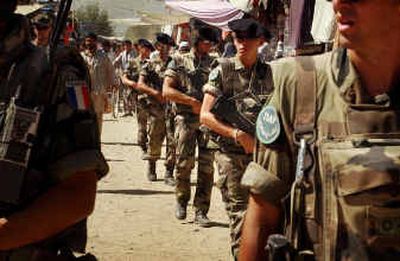Faction of ex-Taliban holding U.N. workers

KABUL, Afghanistan – A breakaway faction of the Taliban movement on Saturday provided the first direct proof that it was holding three U.N. workers who were abducted last Thursday at gunpoint. The group threatened to execute them unless foreign troops left Afghanistan and Taliban prisoners were freed from jails here and at the Guantanamo Bay naval base.
In satellite telephone calls to news agencies, Ishaq Manzoor, who identified himself as commander of a group called Jaish-e-Muslimeen, or Army of Muslims, provided two numbers he said were taken from identity cards of two of the hostages. Diplomatic sources identified one of the numbers as that of a bank card belonging to Annetta Flanigan of Northern Ireland, one of the three hostages.
The other two captives are Philippine diplomat Angelito Nayan and Shqipe Habibi, from the Serbian province of Kosovo. All three are employed by the Joint Electoral Management Body, a U.N. and Afghan agency that organized Afghanistan’s first democratic presidential election on Oct. 9.
The kidnappings marked the first time Westerners had been seized in the Afghan capital and drew broad attention as ballot counting continued toward an expected announcement of victory by President Hamid Karzai.
That announcement, initially expected for Saturday, has been delayed because of an investigation into irregularities, and likely will be delayed further as Afghan and U.N. officials decide how to respond to the kidnappings.
In separate telephone calls to four news organizations, Manzoor and a spokesman for the Army of Muslims, Akbar Agha, issued varying demands for the hostages’ release and promised to provide a videotape that would show all three soon.
Manzoor said all of the hostages were safe, but that one, Flanigan, was slightly ill and had been given medicine. He did not specify her illness. He warned that the hostages would be killed if Afghan soldiers and the NATO-led peacekeeping unit, the International Security Assistance Force, did not call off their search for them. Later, he called first for British troops, and then all foreign soldiers, to leave Afghanistan. He demanded freedom for Taliban prisoners being held here and at Guantanamo.
Security experts said the repeated telephone calls and the shifting demands suggested a lack of long-term planning on the part of the kidnappers. “A lot of contact with the press agencies – that strikes me as kind of amateurish,” said Nick Downie, project manager of the Afghanistan Nongovernmental Security Office, which provides security advice to relief agencies here.
Downie and others said they were increasingly convinced that the three were targeted because they were with the United Nations and were involved in the election process, and that the threat may not extend to all foreigners in the Afghan capital.
Still, relief agencies and diplomatic missions were taking few chances, restricting all but essential travel around the city and imposing a curfew on employees who ventured outside their heavily guarded compounds.
Foreign peacekeepers increased their patrols around the city, and at least two shooting incidents were reported.
A spokesman for the international peacekeeping force urged calm. “We should remember that this is a unique event,” said Lt. Col. Patrick Poulain. He said his force “does not believe this is an indicator of a worsening security situation.”
Afghan police detained several suspects on Friday, including three men wearing military uniforms and carrying AK-47 rifles, details that matched witnesses’ description of the kidnappers.
But officials said later that the men were not believed to have been involved in the abductions.